In Conversation: Brandon Watkins of Year of the Knife
After a life-altering van accident that left his wife and bandmate recovering from severe brain trauma, Brandon Watkins is dead set on surviving together.
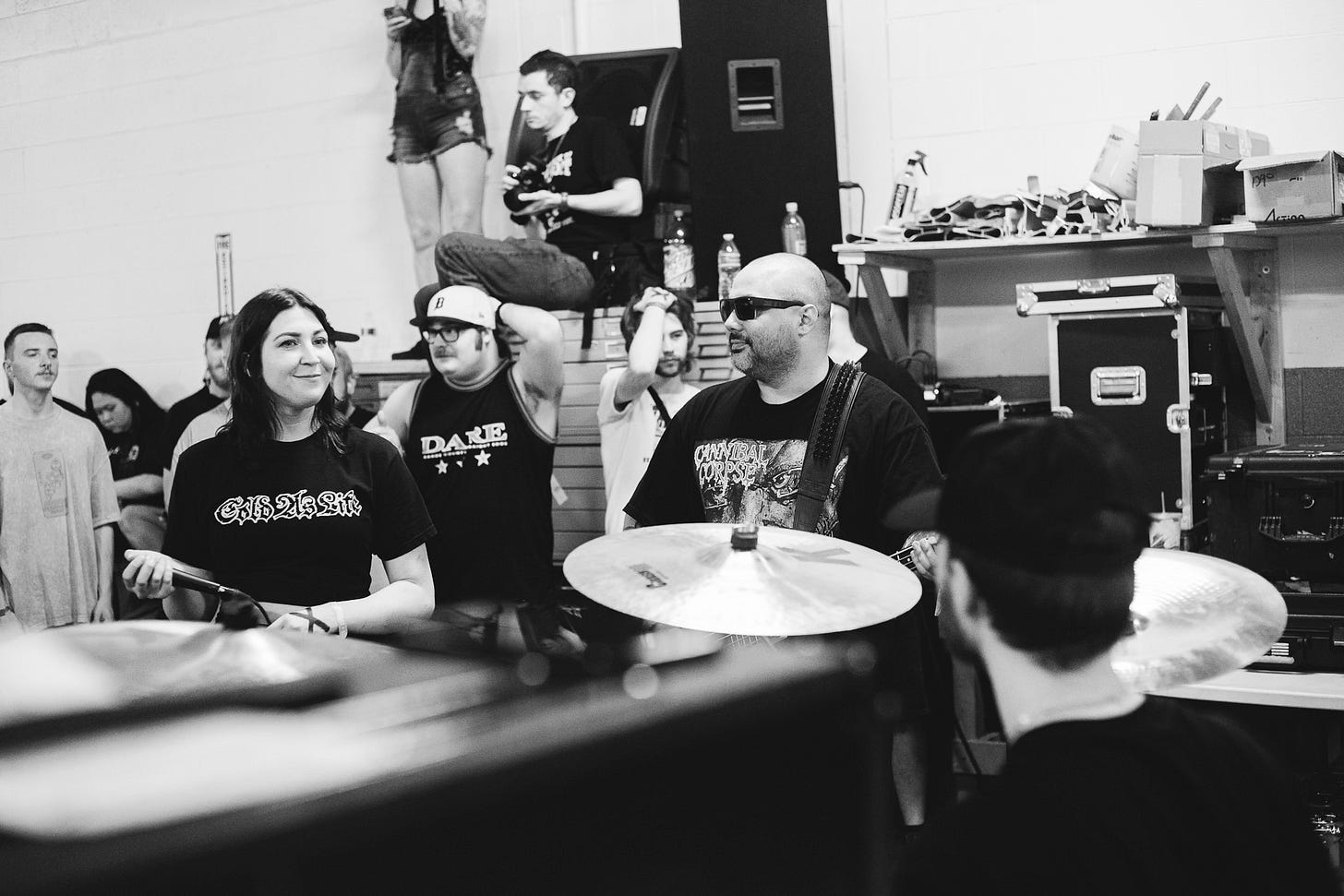
When the first reporting came out after Year of the Knife suffered a horrific van accident en route to Colorado Springs from Salt Lake City in June, the pictures of their vehicle—literally mangled underneath the truck of an 18-wheeler—told the story with more vivid detail than words ever could. It was no wonder that all four members of the band were hospitalized, but singer Madi Watkins suffered the worst of it, sustaining not only multiple fractures, but a traumatic brain injury that placed her in a medically-induced coma as well.
"Every time I see [the van], I think that we should have died,” said her husband and Year of the Knife guitarist, Brandon, at the time. “When I look at the pictures of that, it's just unimaginable that we lived.”
Four months later, Brandon and Madi are finally home in Delaware. The band is releasing a new album this week called No Love Lost—with 100 percent of the sales proceeds going to the band’s recovery fund—but the cause for celebration is punctuated with a comma, not a period: Despite being discharged from the hospital on September 29, Madi will still need to undergo an unknown amount of rehabilitation before she can expect to show substantial neurological improvement, while Brandon is cautiously (and perhaps even nervously) settling into his role as a caretaker. This is the beginning of a long journey for him, too, and he’s still very much processing their new life on the spot—and sometimes mid-sentence. It’s a difficult place to be in, and I tread with sensitivity to this moment. I appreciate Brandon so much for agreeing to let me in.
When I think of Year of the Knife, I think that there’s this pattern of upheaval, adaptation, and transformation that’s kind of amazing. Even before the accident, that cycle was a part of your story. So I kind of want to start there. Because even when the band started, like, Tyler [Mullen] wasn’t even the first singer, right?
BRANDON: Right. Tyler was the drummer. Ultimate Aggression is actually two different demos that we put together and re-recorded. The first demo was called Ultimate Disease. We were doing the demos for that at my house, and we were having “singer problems.” [Garrett] just didn’t want to come to practice, and we just weren’t feeling his vocal style with the direction of the music. Tyler was doing backup vocals on that, and we really liked the way he sounded, so we thought, why don’t we roll forward like that? And that’s what we did. We kicked the singer out.
Did you actually register that as an upheaval or was that more of an optimistic start?
BRANDON: I don’t know how I thought about it. It just felt like this is what we need to do, so this is what we’re going to do, you know what I mean? It was an action that came from a need. I didn’t think about it as an upheaval, thought it totally was. It’s crazy I’ve never thought about it like that. Because when you were saying initially that we’ve been through a bunch of different upheavals, it’s like, wow. We really have totally upended this band and thrown it on its ass.
You and Madi have always been the anchor in the lineup. You’ve been together [as a couple] since you were fifteen years old, right?
BRANDON: Yeah. We had a friend in school that was into hardcore and into going to shows. We live in central Delaware, but all the shows and everything took place 45 minutes north of us. He took me to shows, and he was dating a girl, and she had a friend, and she was like, “It would be so cool if our best friends dated!” So Madi sent me a MySpace request and I hit her up on AIM [laughs]. From there, it just blossomed.
You’ve called your childhood town “rural.”
BRANDON: Madi lived in a suburban area and my area is all cows and shit [laughs]. Hers was more like they got the big mall up there and they had restaurants, where all we had were just the chains, like McDonald’s.
I was so lonely growing up. You can’t even walk to your friend’s house where I used to live. I met kids in school, but nobody lived near me. I moved here from Baltimore when I was eleven, and when we lived in Baltimore, I had tons of friends and a big neighborhood. Then we moved to this rural area and it was just so lonely for me. That’s when I found [hardcore]. I was listening to the Punisher soundtrack and I found Hatebreed. It was the most crazy shit I’d ever heard. I never thought about going to a show to see Hatebreed play because I didn’t even know about shows. So when my friends started taking me, and I started to see kids dance, and I started to see kids be friends, it was like I found a way not to be lonely. I found a place that was tight-knit, where you could make friends and you could see your friends every weekend. It gave me something to look forward to. It totally changed my life.
I also think it’s interesting that a band that sounds like Year of the Knife is so vocally straight-edge. Like, obviously there have been metalcore straight-edge bands before, but there’s something about your sound that doesn’t even feel like it’s from that lineage to me for some reason.
BRANDON: Yeah, it’s kind of unhinged. I mean, I’m straight. We’re all straight-edge. We are a straight-edge band. We love straight-edge bands, but for me, everything I like has always been much more aggressive. I never really got into the Youth Crew [bands]. I like crusty stuff, but otherwise, the more punk side of things wasn’t really my thing. Some of the early hardcore bands don’t do it for me the way the original metalcore bands do. So I take way more influence from the metal side of things, where everybody isn’t straight-edge.
Which would mean to me that it was more about the lifestyle than the music for you in the first place.
BRANDON: Absolutely. Growing up, I saw the appeal and I tried it out, but it wasn’t for me. My grandparents are addicts. My surrounding family—my mom’s brothers and sisters and stuff—they’ve got alcoholics and drug use. I hated it. I hated being around it. It was a hard thing for me to see, and I never wanted to be like that.
I was kind of straight-edge before I found out about straight-edge. The kids at school would call me straight-edge and I’d be like, “What the fuck is that?” [laughs]. But I thought it was cool that there were other kids like me. Obviously, not everybody gets it on the level that you get it, but it was cool to find other kids that weren’t going to make fun of me because I didn’t want to smoke weed or drink beer.
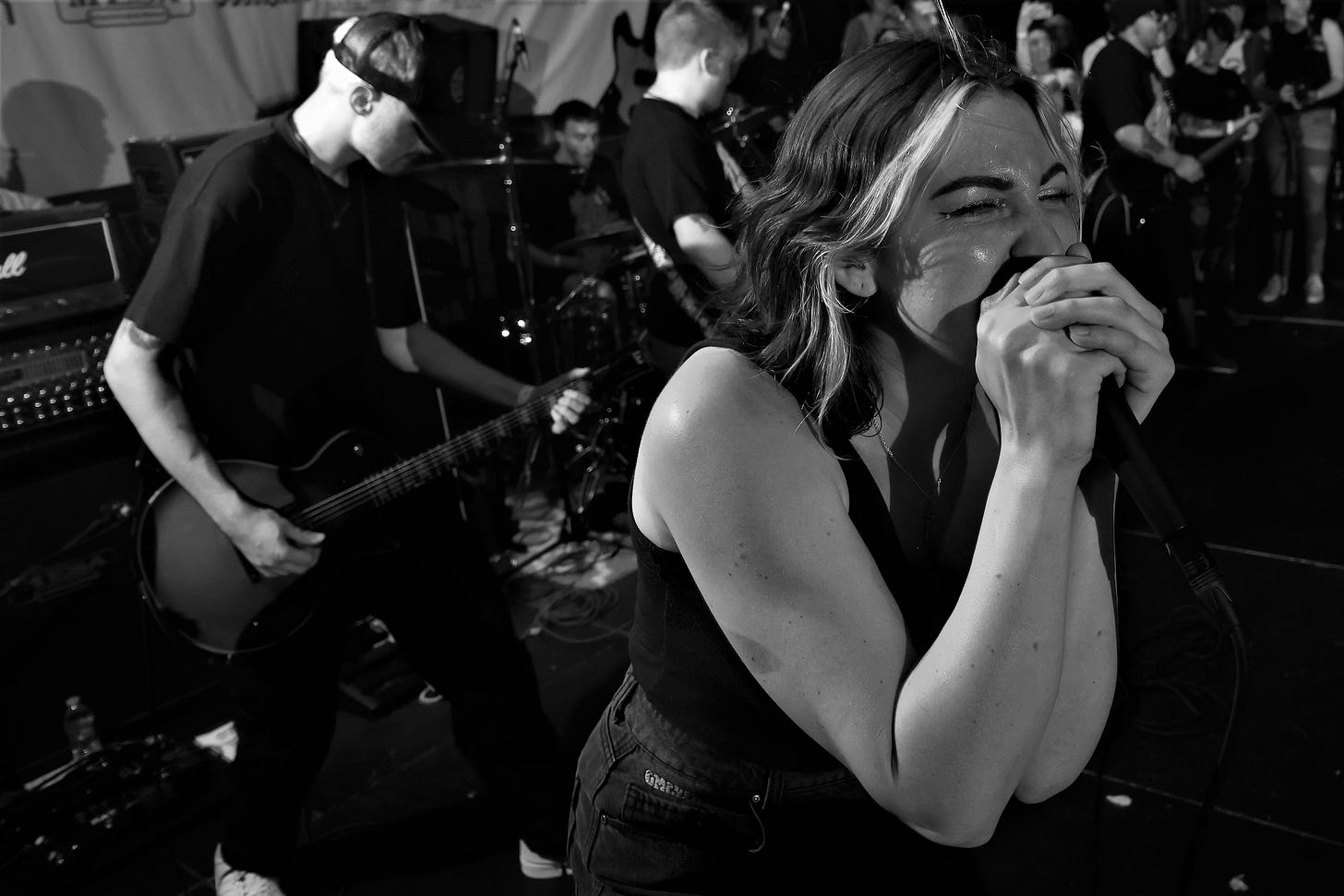
OK, let’s move on to your second upheaval. You put out your second album, Internal Incarceration. It’s a great album and people are responding to it. But then you go on a European tour and all of the sudden Madi steps up to sing lead. So, first of all, let’s just get this out of the way. What exactly happened with Tyler? Because I’ve never seen any real explanation. It was all very vague.
BRANDON: Essentially, Tyler was falling out of love with the band. He was not coming to practice. We were writing a lot, and we wanted him to really be a part of that, but he had other priorities. He had other shit going on in his life, you know what I mean? So we were gearing up for this European tour, and we were like, “Where’s your passport? Are you good?” And he said, “Yeah, I just need to get it renewed.” And he waits and waits and waits and it never comes to fruition. He just didn’t want to do the Europe tour. He fucking hates going to Europe. So he just never got his passport to go to Europe with us, which was a big what-the-fuck.
But you go to Europe without him. At what point do you realize another change is really happening?
BRANDON: When we’re in Europe and we’re playing with Ignite. We were backstage, and I was talking to [my band], and I was like, “I think we have to kick Tyler out.” We were playing the biggest shows we’d ever played, we were about to go home and play This is Hardcore, we are doing our best shit ever, and it feels the best that it’s ever felt. There’s nobody dragging each other down. There was no feeling of dread. There was no feeling of, like, “this could be better.” It was perfect. It was just working and Madi was fucking crushing it. So I pulled everybody aside and said, “This is what we gotta do.” And they were like, “Nah, we’re not doing that.” But then the dudes from Ignite came in and talked to us about kicking their singer out, and it turned into, “Yeah, that kind of makes sense!” [laughs]. So from there it turned into an actual conversation. When we got home, we tried to talk to Tyler about it, but we didn’t get a conversation out of it. I’m not going to air him out, but he acted pretty childish.
Was the decision to move Madi to lead singer always the first choice?
BRANDON: We knew we were going to go to Europe without Tyler. So I said to Madi, “We’re going to Europe, Tyler’s not going to come, so either you’re going to sing or I’m going to sing. What do you want to do?” She was like, “I want you to sing.” And I told her, “I want you to sing. I think it would be a better move anyway, to have [a woman] singing, because it’s much more empowering to so many other people and it’s an opportunity to elevate the band more and make it mean more.” And she was like, “OK, yeah. I feel that.”
We did three practices with Madi singing, and then we went to Europe to play Jera on Air and Outbreak Fest and all these fests where we were playing to thousands of people. I just thought, this is where our band has to go. We’re playing to our biggest crowds. It’s crazy not to do this.
It must also have been a huge mental leap for her, though, to all of a sudden lead the band. Was that contentious at all? Because honestly, that would have fucked me up a little bit [laughs].
BRANDON: She was definitely nervous, and rightfully so—to go from playing bass and doing backing vocals and being in the background to straight up holding the mic and interacting with these huge crowds. It was crazy. But Madi went to school for art; she went to school to be a singer. She grew up singing and doing all this stuff, so I feel like she was just better prepared for it. She had all the songs memorized by the first practice, you know what I mean? She was ready. Obviously, she was nervous. But there was never, “I can’t do this.” She was a boss.
You also had to figure out how to write with this line-up, because I feel like Madi’s lyrical approach is different from Tyler’s. Whereas Tyler’s lyrics felt a little more social or political in nature, Madi’s lyrics feel more internalized or personal. You’ve talked about No Love Lost being the most collaborative Year of the Knife record, so I wonder if there was a conversation about adapting to this new lyrical direction.
BRANDON: I can feel that. When I think of Tyler’s lyrics, though, I think he did a lot of political stuff, but he also did a lot of “emo” stuff. Like, one of the big things when we were doing Internal Incarceration was that Tyler had a big meltdown in the studio… Damn, I’m really airing Tyler out. But he did. He just wrote all these songs and kind of made the whole record about himself. I didn’t like that at all. When Madi started writing lyrics, she definitely wrote some introspective stuff, too, but I don’t know. It felt good to me. It felt a lot less, “Poor me,” and a lot more, “Fuck you”—you know what I mean? It’s hard to say. I like both of their lyrics.
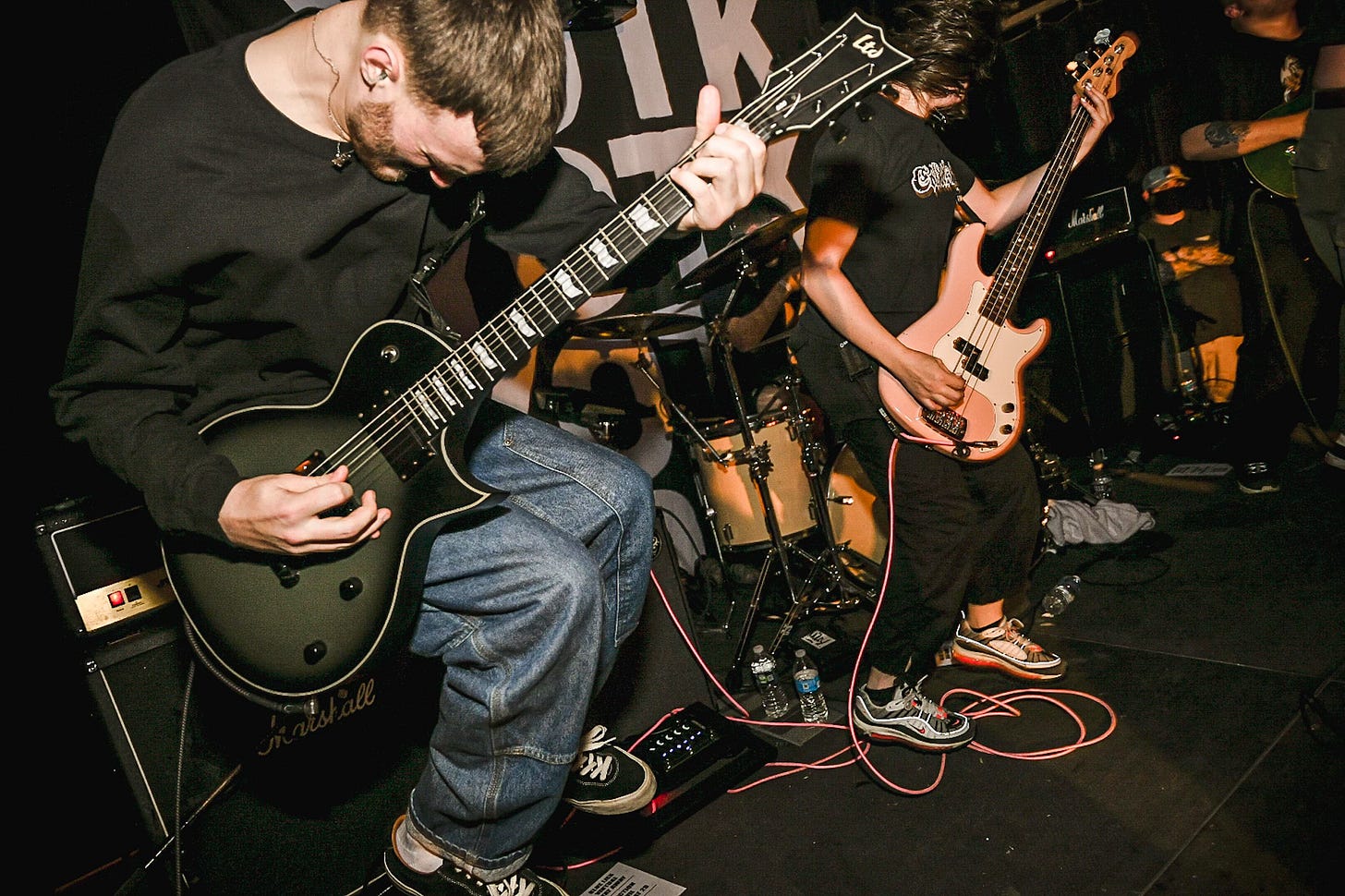
I feel like this is where we should probably start talking about June. Because I have to imagine that, at this point, you’ve settled from the upheaval of Madi moving to vocals. You’re making new music. You’ve got an album in the can. And you’re probably just ready to be the band that you are.
BRANDON: Yes, totally.
So my understanding is that when you had the accident, your concussion left you with no memory of that day. Have you been able to piece that back together at all since?
BRANDON: I mean, essentially, I know what happened. But no, I don’t remember it. Like, [guitarist] Aaron [Kisielewski] told me what I said right after the accident happened, and that’s the closest I am to remembering the accident.
I don’t know what you know about my traumatic brain injury from 20 years ago.
BRANDON: Just a little bit, but I’m very interested.
It’s different, but there are similarities. For me, though, I was literally just crossing the street when a tow truck ran into me. I was in the hospital for two months. I had my pelvis broken in two places, my wrist broken, and bruised ribs, but the traumatic brain injury was the worst of it. I also have no memory of the accident itself. I’ve only been able to piece things together from the calendar I kept and police reports and hospital records. I was unconscious for three days, but I do remember waking up. What was your first memory back?
BRANDON: I woke up in the hospital bed. They told me I’d been throwing up all night because I had a concussion. I asked, “Where’s my wife?” They said, “She’s in the I.C.U.” I was like, “What does that mean?” And they were like, “She’s in the I.C.U.” And I said, “Can you tell me more?” And they were like, “She’s in the I.C.U.” I was freaking the fuck out. Being scared. It was so weird to wake up in that bed.
How did you perceive your own injury?
BRANDON: Like I didn’t have one, because I felt fine.
How long was it before you actually got to understand the extent of Madi’s injuries?
BRANDON: I think I fell back asleep after that, but it was only a few hours. They let me go back up and see her; they discharged me pretty much as soon as I was fully awake. They took me to go see Madi and… [pauses]. I don’t have any words for it. It was just awful.
At that point they started to talk to me about her status and what was all going on. They don’t tell you that “everything is going to be alright.” They tell you that “we don’t know what’s going to happen.” So that was hard. I had no idea about [traumatic brain injuries]. I’d never even thought about it. Different doctors would come in and talk to me about different things, depending on what they were doing. But I remember the neurosurgeon came in and went over her MRI or CT Scan with me and they showed me her brain and where there was blood or where there was shearing or whatever.
What’s crazy is that the neurosurgeon is the one who told me that she was going to make a full recovery, that this is going to be OK, but that it’s just going to take time. But the hospital’s educator came to me saying, “Well, she could have severe brain damage. She might never be this way again”—all those things. It was like somebody that had no idea what the fuck they were talking about was coming in and giving me worst case scenarios, while someone who knew what they were talking about came in and gave me hope. It was really interesting for me to see those two ends of the spectrum.
I mean, the problem with brain injuries is that a lot of it is really dependent on the next steps and the person and… there are so many variables. I went to a neurologist and took over 20 tests to understand everything that happened, and in my case, my brain mostly suffered in the areas of memory—specifically, short-term memory and visual memory—and also in terms of agitation, or that part of the brain that manages your impulse control. I was snapping very easily. I also lost my sense of smell, which I never recovered. So on some level, it sucks to give you worst-case scenarios, but I think that’s also part of the process. Hope should be there, too, but when the brain gets fucked with, it’s unpredictable.
BRANDON: Yeah, totally. I just think that I was… I still am in a weird place. Hearing that just pissed me off, but her telling me that was the right thing to do.
How would you describe that “weird place”?
BRANDON: I’m hyper-emotional. It’s hard. I still don’t know what’s going to happen. Umm… [cries softly]… Excuse me… [pauses] I’m just hopeful, but I feel pissed. I feel upset. Not at anybody in particular, but just at the situation in general.
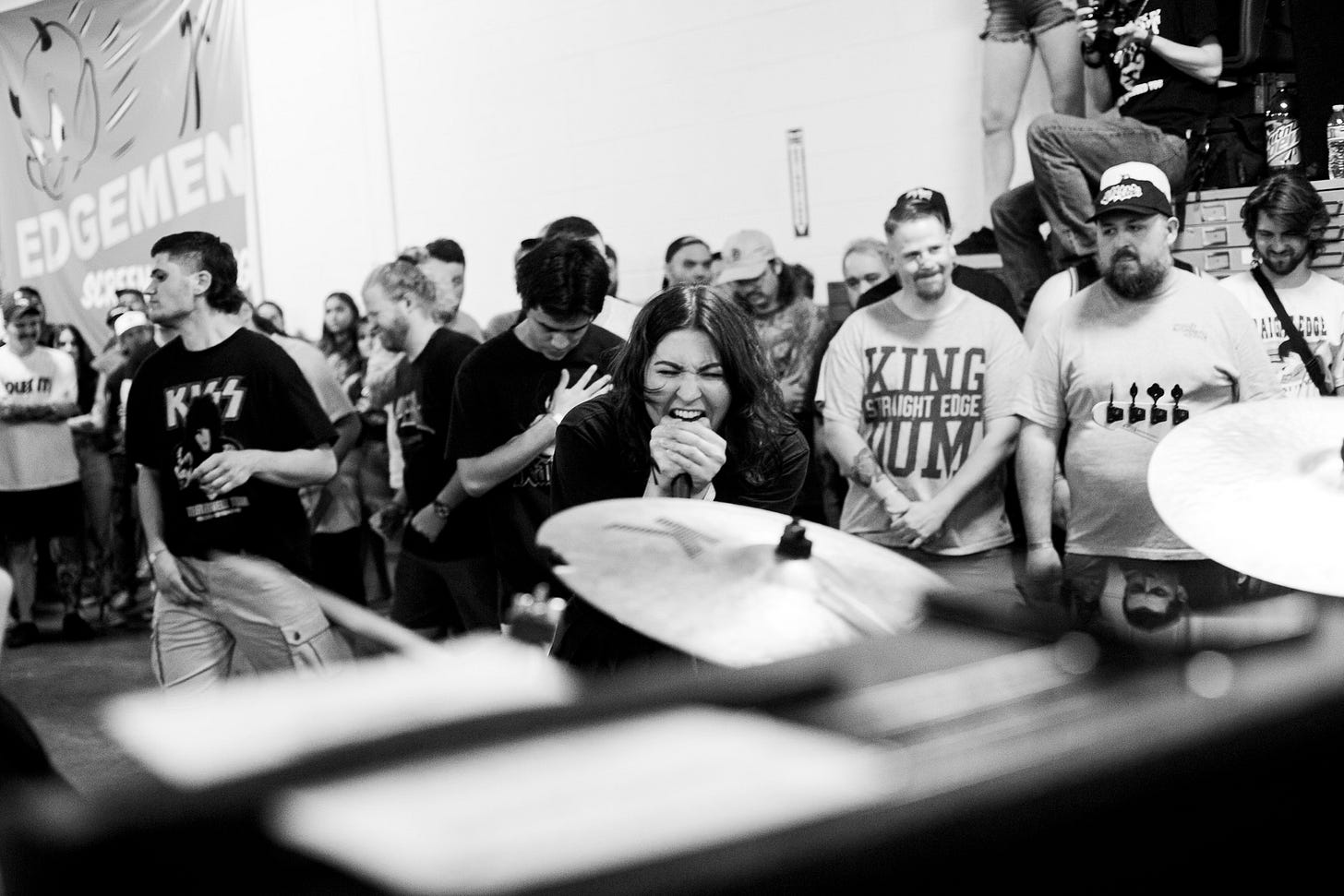
I think the hardest part about being a caretaker is asking, are you taking care of yourself?
BRANDON: I’m trying to, but it’s hard. I’m still trying to get into a rhythm, still trying to find my place with Madi right now. It’s going well, and we’re doing really well. I’m getting her set up with all the different therapies and everything.
But sleep is the most important thing for me right now. Me and Madi chill all day—we play video games or watch movies or stuff like that—and there’s an element of taking care of myself in that, but mostly it’s just trying to sleep.
For me, Rob [Fish from 108] was my caretaker. He took me into his home when I got out of the hospital and I lived with him and his family, and it was wonderful. And it’s something I’m sure Madi feels, even if she can’t always express it the way she wants, because I loved Rob so much. But when I think about it now, there must already be this feeling of helplessness as a caretaker, but then you are also trying to keep everyone else upbeat and optimistic.
BRANDON: And on top of that, I’m also trying to manage everybody else because everybody wants to be here all the time, and it’s like, I can’t have you at my house all day long, you know what I mean? I feel all of that for sure. Madi is so grateful, she’s the most gracious person I know.
Do you ever feel an element of survivor’s guilt?
BRANDON: Yeah, but more that I just wish it was me and not her. I feel that for sure.
Andy [Kisielewski, Year of the Knife drummer] recently made the comment that “given our current state, it wasn’t the easiest decision to put out a record.” I kind of wanted you to walk me through that decision.
BRANDON: Well, for me, I was like, “Let’s put it out.” Because it was supposed to come out. For [Andy and Aaron], I think there was a lot more guilt. There was a lot more that, for whatever reason, kept them from wanting to do it. Whenever I tried to talk to them about it, they would only answer me a long time after I texted them or they wouldn’t answer me at all. I just couldn’t understand why you wouldn’t want to put it out. But I do understand now. Because we’ve had to do it all without Madi, which is crazy because Madi is the leader of the band. I mean, I help Madi make the decisions for the band and everything, but Madi is the one that carries out everything. Madi is the boss. Doing this stuff without her is so crazy to think about. So I think that was probably really hard for them.
I mean, you’re not out of the woods yet, but I do feel like you may be in a place where you can be a little more optimistic about the future and maybe this record is a part of that story?
BRANDON: Absolutely. I think so. I think it’s definitely uplifting us, and it’s definitely giving us good feelings, and Pure Noise is giving us the proceeds from the record, so that’s a big help, too. It was just hard for them to come to the decision to put it out.
What actually was Madi’s role in all this?
BRANDON: Well, it’s hard because instead of asking her about it, I’m telling her about it. I’m like, “We’re going to put these songs out. What do you think?” And she’s like, “I’m excited. I can’t wait.” Actually, when one of the first songs came out, she was still coming out of the vegetative state. When “Wish” and “Last Life” came out, though, I was showing her the songs and she was singing along to it— which is really special. I think she is excited to have it out. I think she just wants to listen to it more; she wants it all to be out so she can listen to it on Spotify, even though I have the masters.
Once it came out, she was like, “Brandon, I haven’t posted anything about the Year of the Knife songs and I want to post about it.” So I [helped her make a] post. It’s a hard place to be in, because it feels like we’re kind of robbing her of the release, because she didn’t really get to be a part of it, you know what I mean? But I do think she’s happy and grateful.
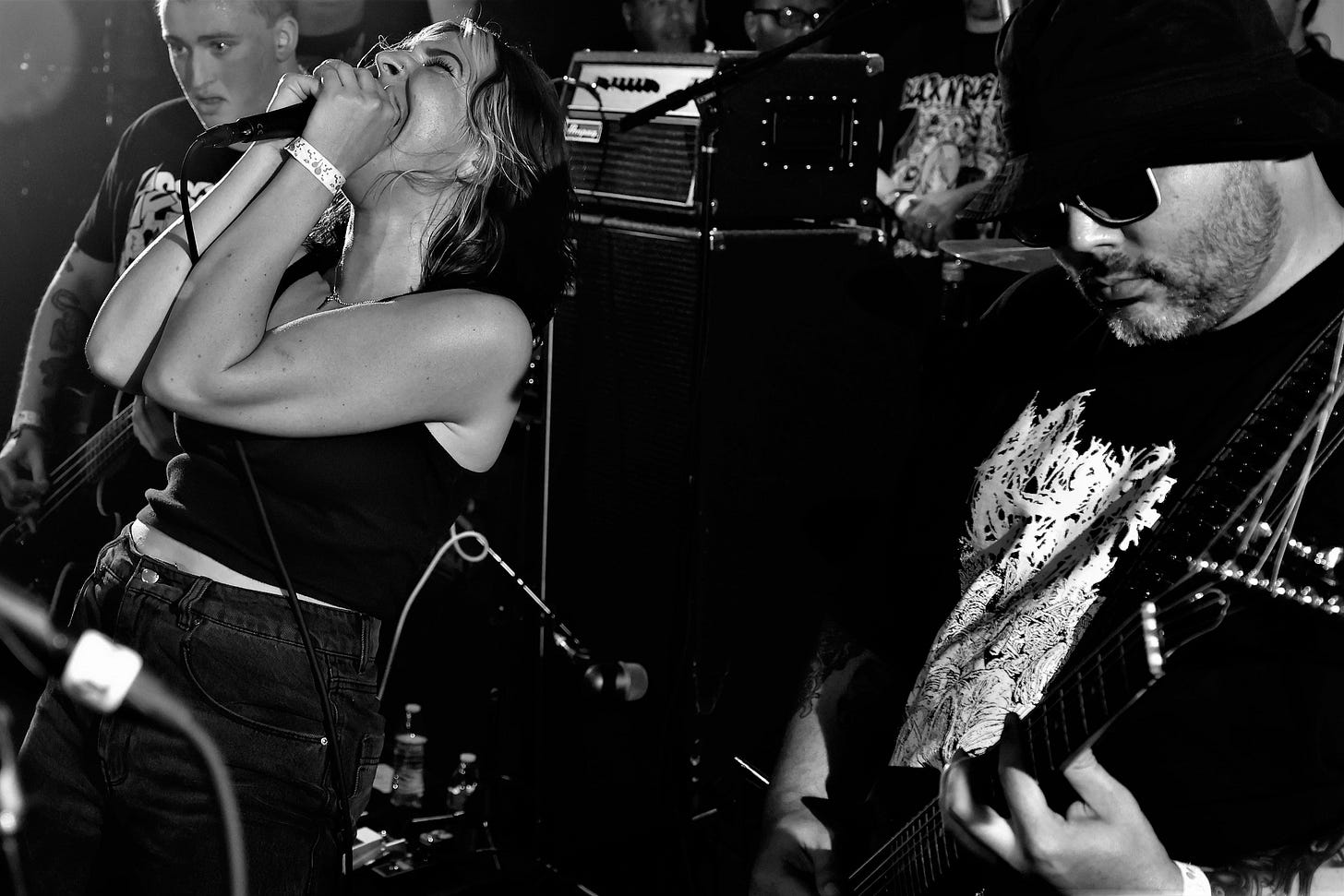
There’s something that Madi said in an interview once that I thought was totally amazing, given all that has happened since. She said, “There is no support system in the world that understands and has your back like the people in [the hardcore] scene. That is something that I truly don't believe can be said of other communities in such a deep-rooted way.”
BRANDON: Wow.
Obviously, I know you must be grateful for the support you’ve received from the hardcore scene and from the GoFundMe, but I also want to understand a little bit more about how you feel or how this experience changed or reinforced your ideas about hardcore and the scene that you are in.
BRANDON: It’s interesting. I still haven’t been back to a show in Philly, or in our area, but I went out to two shows in Salt Lake City when we were out there and the way that people treated me, the kindness and the respect, and the people that I met out there through hardcore—they took care of me. I made some new friends out there. My friend Joe Hardcore sent me some numbers of kids from Salt Lake and they took me out to dinner and took care of me. They let me borrow an Xbox, you know what I mean? Just like, little shit to keep me sane. And I feel like there isn’t another place like that. There isn’t another place where you’re going to text a stranger, essentially, and be like, “Hey, I need friendship,” and they’re just going to give it to you unconditionally. And then on top of all that, there’s the GoFundMe, and all the people supporting you. I’ve never seen anything like that. It’s so incredible. It’s almost too much to handle.
How do you think the accident has changed the way you look at the band?
BRANDON: It just made it more special. I mean, obviously, Madi is my wife. But I’ve always felt like these were my brothers and my sister. I’ve always felt like family with these people. And now I feel that connection is so much deeper after going through this. I care so much. Not like I didn’t care before, but it’s just like my care is a lot deeper. It’s always been really special to me, but it’s just not going to go anywhere.
I was basically in a bed for six months during my recovery, and when you are able to lay in bed for six months, you really start to think about what’s important. There was a point where I was like, “I'm doing a lot of shit that doesn’t matter.” I know your experience is a little bit different, but has there been anything that you’ve been able to let go of since the accident?
BRANDON: For sure. Like, with all the Tyler stuff. There was a lot of drama in our local scene about it, and I’ve really let go of all that. But it’s interesting that you say that because that was my thought with Madi. I thought, “What if Madi wakes up and she doesn’t want to be with me anymore?” Or, “What if Madi wakes up and she doesn’t want to do the band anymore?” You know what I mean? All those things ran through my mind. Being able to talk with her about it afterwards, when she’s in a better state like she’s in now, all of those thoughts of mine have been disproven, thankfully. But it totally would have made sense for her to wake up and be like, “This band fucking sucks. I almost died. Why would I want to do this again?” So yeah, I totally feel that. There’s just not a lot that matters to me past my wife and past the band and past my friends.
It’s obviously too early to say if or when Year of the Knife could come back in some way. How are you processing that? Like, it’s clearly important to you, but after everything you’ve been through, how do you even think about it?
BRANDON: I still want to tour. I still want to do all the stuff that we were doing. We had so many tours lined up that got canceled or that we had to drop out of. But I want to pursue it just as hard as I was. Me and Madi do Candy Corpse and Year of the Knife. Candy Corpse is our business. That’s the way I was making money. That’s what I was doing as a job. That’s what I want to do. I want to be a musician, and I want to be an artist. I’ve talked to Madi about it, and even from when she first woke up, she was like, “I still want to tour.”
There’s another thing she said in an interview once that I also think rings true with this story. She said, “Hardcore helps to make sense of all the things you feel like you can’t control.” I feel like you must be in this place where you feel a distinct lack of control right now.
BRANDON: For sure. I mean, I don’t have to explain to you why we listen to hardcore music, but it just makes you feel better. It makes you feel like somebody else feels the way that you feel.
If we go back to the beginning of this conversation, where we talk about upheaval, adaptation, and transformation, then upheaval is always the stuff you can’t control. It’s the shit that happens to you. And having gone through these escalating versions of upheaval, I’m curious about where your resilience or sense for adaptation comes from.
BRANDON: My whole life has been upheaval and resilience and adaptation, ever since I was a kid. My dad was abusive to my mother and abusive to us. And so my life was always waiting, waiting, waiting, big change. Then adaptation to that change, waiting, waiting, waiting, big change. You know what I mean? It was just constantly happening. You can’t be anything but hopeful for what comes next because whatever comes next, hopefully, won’t be as bad as what came before. My life isn’t as extreme as it was when I was a kid, but I still carry those same values. So I’m always hopeful for the future. I’m always hopeful that what comes next is going to be better than what was happening before.
Anti-Matter is reader-supported. If you’ve valued reading this, please consider becoming a paid subscriber and backing independent, ad-free hardcore media. Thank you, friends.



Norman. Everything you write, resonates. Thanks for sharing this and the go fund me link. I hope the extended hardcore scene, like myself, that might be unaware of the newer generation, will follow the go fund me link and give these guys the hardcore support they need. I just did after reading about a band I have never heard. May Madi have the most she can in her recovery.
I’ve half written a comment about heartache and the trauma of forced growing up. I’m at a loss but man, I felt a lot reading this.